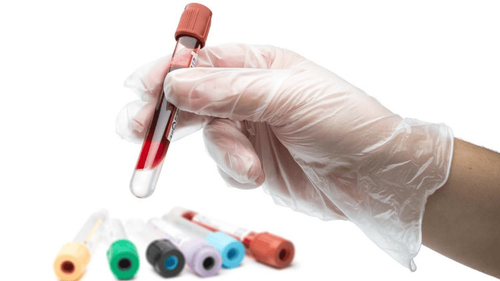This is an automatically translated article.
About half of patients with systemic lupus erythematosus develop some form of kidney inflammation, known as lupus nephritis. This inflammation can lead to kidney failure. However, the course of lupus and its effects on the kidneys is difficult to predict.
1. Lupus kidney complications - lupus nephritis
Lupus erythematosus, also known as lupus, is an autoimmune disease that occurs when the body's immune system mistakenly attacks its own tissues. Some common symptoms are rash, joint pain, fatigue. About half of people with lupus develop some form of kidney inflammation known as lupus nephritis. Lupus nephritis is an inflammation of the kidneys caused by lupus, when lupus autoantibodies affect structures in a patient's kidneys.
This inflammation, makes it impossible for the kidneys to work properly and causes protein loss in the urine. If this condition is not controlled, lupus nephritis can lead to kidney failure.
Some of the known risk factors for lupus nephritis are:
Gender: Although women are more likely to get lupus, men are more likely to get lupus nephritis than women. Race or ethnicity: Blacks, Hispanics, and Asian Americans are more likely to get lupus nephritis than whites.

Nam giới bị viêm thận lupus nhiều hơn phụ nữ
2. Manifestations of lupus nephritis
Lupus nephritis is a serious condition that needs attention. However, the symptoms of the disease are not always dramatic. Initially, lupus nephritis may cause no signs or symptoms, until the inflammation is widespread and prolonged, leading to impaired kidney function and symptoms.
For many patients, the first noticeable symptom is leg swelling: Swelling in the ankles and feet. Swelling can also appear on the face or hands but is less common.
Symptoms may vary from patient to patient, including:
Weight gain High blood pressure Dark urine, brown urine due to blood in urine Foamy urine due to increased protein in urine Nocturia Nocturia High blood creatinine Not all urinary or kidney problems in lupus patients are caused by lupus nephritis. Patients with lupus erythematosus may be more susceptible to urinary tract infections, causing frequent urination and painful urination.
Some lupus medications can also affect the kidneys, causing leg swelling and other symptoms similar to lupus nephritis. These symptoms usually go away when the drug is stopped.
If a person is diagnosed with lupus erythematosus, the doctor may recommend tests to evaluate kidney function. If a kidney function problem is found, your doctor may recommend a kidney biopsy to determine the severity of your kidney disease.

Bệnh nhân được chỉ định xét nghiệm để đánh giá tình trạng bệnh thận
3. How is lupus nephritis diagnosed and treated?
After a medical history and physical examination, the doctor may order tests to confirm the diagnosis. Tests used in diagnosing kidney problems include:
Urine tests Blood tests Imaging tests: Ultrasound, biopsy There are five different types of lupus nephritis identified by kidney biopsy. . Treatment depends on the following factors:
Type of lupus nephritis Symptoms Symptoms Severity of the disease Based on these factors, your doctor will recommend an individual treatment to respond to each specific situation. patient's body.
Medications used in the treatment of lupus nephritis include:
Corticosteroids: To help reduce inflammation, your doctor may prescribe them until your lupus nephritis improves. This drug can cause a range of serious side effects, so use should be monitored and the dose reduced as symptoms begin to improve. Immunosuppressants: They work by blocking the action of the immune system that damages the kidneys. Medicines to prevent blood clots or lower blood pressure if needed. When kidney function is severely impaired, dialysis may be necessary and eventually a kidney transplant may be necessary.
Along with following the treatment prescribed by the doctor, patients with lupus nephritis should follow a number of lifestyle habits to help protect the kidneys, including:
Drink enough water A low-sodium diet, especially if you have high blood pressure Avoid smoking and alcohol Exercise regularly Maintain healthy blood pressure Limit cholesterol Avoid medications that can affect the kidneys such as nonsteroidal anti-inflammatory drugs (NSAIDs). In addition, your doctor may also recommend that you eat a diet low in potassium, phosphorus, and protein if you have lost kidney function.

Người bệnh cần hạn chế các loại thuốc có thể gây ảnh hưởng đến thận
4. Complications of kidney failure because of lupus
Treatment works well in controlling lupus nephritis, so the patient may not have complications.
However, there are still patients who experience the following kidney lupus complications:
About 10 - 30% of patients with lupus nephritis have kidney failure. The most severe form of lupus nephritis is diffuse proliferative nephritis, which can cause scarring in the kidneys. Scarring is permanent damage, kidney function is often impaired as more scarring is formed. People with lupus nephritis have an increased risk of cancer, mainly B-cell lymphoma, a type of cancer that starts in the cells of the immune system. Patients with lupus nephritis also have an increased risk of cardiovascular problems. Lupus nephritis is a common complication in people with systemic lupus erythematosus. Lupus nephritis can lead to blood in the urine, proteinuria, high blood pressure, impaired kidney function, and possibly even kidney failure.
Vinmec International General Hospital with a system of modern facilities, medical equipment and a team of experts and doctors with many years of experience in medical examination and treatment, patients can rest assured to visit. examination and treatment at the Hospital.
To register for examination and treatment at Vinmec International General Hospital, you can contact Vinmec Health System nationwide, or register online HERE.
References: mayoclinic.org, niddk.nih.gov, webmd.com













